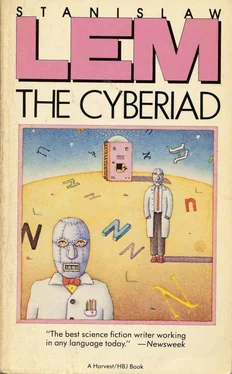“What? Here I was able to see through his little game and gave him so good a shellacking for it that he had to sneak home in the middle of the night and patch himself up, and even then he looked a sight! And for that they decorate him, praise him, shower him with riches? O tempora, O mores!…”
Furious, he went home, locked himself in and drew the blinds. He too had been working on a Machine to Grant Your Every Wish, only Trurl had beat him to it.
THE SEVEN SALLIES OF TRURL AND KLAPAUCIUS
The First Sally
or
The Trap of Gargantius

When the Universe was not so out of whack as it is today, and all the stars were lined up in their proper places, so you could easily count them from left to right, or top to bottom, and the larger and bluer ones were set apart, and the smaller, yellowing types pushed off to the corners as bodies of a lower grade, when there was not a speck of dust to be found in outer space, nor any nebular debris—in those good old days it was the custom for constructors, once they had received their Diploma of Perpetual Omnipotence with distinction, to sally forth ofttimes and bring to distant lands the benefit of their expertise. And so it happened that, in keeping with this ancient custom, Trurl and Klapaucius, who could kindle or extinguish suns as easily as shelling peas, did venture out on such a voyage. When the vastness of the traveled void had erased in them all recollection of their native skies, they saw a planet up ahead—not too little, not too big, just about right—with one continent only, down the middle of which ran a bright red line: everything on one side was yellow, everything on the other, pink. Realizing at once that here were two neighboring kingdoms, the constructors held a brief council of war before landing.
“With two kingdoms,” said Trurl, “it’s best you take one, and I the other. That way nobody’s feelings get hurt.”
“Fine,” said Klapaucius. “But what if they ask for military aid? Such things happen.”
“True, they could demand weapons, even superweapons,” Trurl agreed. “We’ll simply refuse.”
“And if they insist, and threaten us?” returned Klapaucius. “This too can happen.”
“Let’s see,” said Trurl, switching on the radio. It blared martial music, a rousing march.
“I have an idea,” said Klapaucius, turning it off. “We can use the Gargantius Effect. What do you think?”
“Ah, the Gargantius Effect!” cried Trurl. “I never heard of anyone actually using it. But there’s always a first time. Yes, why not?”
“We’ll both be prepared to use it,” Klapaucius explained. “But it’s imperative that we use it together, otherwise we’re in serious trouble.”
“No problem,” said Trurl. He took a small golden box out of his pocket and opened it. Inside, on velvet, lay two white beads. “You keep one, I’ll keep the other. Look at yours every evening; if it turns pink, that’ll mean I’ve started and you must too.”
“So be it,” said Klapaucius and put his bead away. Then they landed, shook hands and set off in opposite directions.
The kingdom to which Trurl repaired was ruled by King Atrocitus. He was a militarist to the core, and an incredible miser besides. To relieve the royal treasury, he did away with all punishments except for the death sentence. His favorite occupation was to abolish unnecessary offices; since that included the office of executioner, every condemned citizen was obliged to do his own beheading, or else—on rare occasions of royal clemency—have it done by his next of kin. Of the arts Atrocitus supported only those that entailed little expense, such as choral recitation, chess and military calisthenics. The art of war he held in particularly high esteem, for a victorious campaign brought in excellent returns; on the other hand, one could properly prepare for war only during an interval of peace, so the King advocated peace, though in moderation. His greatest reform was the nationalization of high treason. As the neighboring kingdom was continually sending spies, he created the office of Royal Informer, who, through a staff of subordinate traitors, would hand over State secrets to enemy agents for certain sums of money. Though as a rule the agents purchased only outdated secrets—those were less expensive and besides, they were held accountable to their own treasury for every penny spent.
The subjects of Atrocitus rose early, were well-behaved, and worked long hours. They wove fascines and gabions for fortifications, made guns and denunciations. In order that the kingdom not be flooded with the latter (which in fact had happened during the reign of Bartholocaust the Walleyed several hundred years before), whoever wrote too many denunciations was required to pay a special luxury tax. In this way they were kept at a reasonable level. Arriving at the Court of Atrocitus, Trurl offered his services. The King— not surprisingly—wanted powerful instruments of war. Trurl asked for a few days to think it over, and as soon as he was alone in the little cubicle they had assigned to him, he looked at the bead in the golden box. It was white but, as he looked, turned slowly pink. “Aha,” he said to himself, “time to start with Gargantius!” And without further delay he took out his secret formulae and set to work.
Klapaucius meanwhile found himself in the other kingdom, which was ruled by the mighty King Ferocitus. Here everything looked quite different than in Atrocia. This monarch too delighted in campaigns and marches, and he too spent heavily on armaments—but in an enlightened way, for he was a most generous lord and a great patron of the arts. He loved uniforms, gold braid, stripes and tassels, spurs, brigadiers with bells, destroyers, swords and chargers. A person of keen sensibilities, he trembled every time he christened a new destroyer. And he lavishly rewarded paintings of battle scenes, patriotically paying according to the number of fallen foes depicted, so that, on those endless panoramic canvases with which the kingdom was packed, mountains of enemy dead reached up to the sky. In practice he was an autocrat, yet with libertarian views; a martinet, yet magnanimous. On every anniversary of his coronation he instituted reforms. Once he ordered the guillotines decked with flowers, another time had them oiled so they wouldn’t squeak, and once he gilded the executioners’ axes and had them all resharpened—out of humanitarian considerations. Ferocitus was not overly dainty, yet he did frown upon excesses, and therefore by special decree regulated and standardized all wheels, racks, spikes, screws, chains and clubs. Beheadings of wrongthinkers—a rare enough event— took place with pomp and pageantry, brass bands, speeches, parades and floats. This high-minded monarch also had a theory, which he put into action, and this was the Theory of Universal Happiness. It is well known, certainly, that one does not laugh because one is amused, but rather, one is amused because one laughs. If then everyone maintains that things just couldn’t be better, attitudes immediately improve. The subjects of Ferocitus were thus required, for their own good, to go about shouting how wonderful everything was, and the old, indefinite greeting of “Hello” was changed by the King to the more emphatic “Hallelujah!” —though children up to the age of fourteen were permitted to say, “Wow!” or “Whee!", and the old-timers, “Swell!”
Ferocitus rejoiced to see his people in such good spirits. Whenever he drove by in his destroyer-shaped carriage, crowds in the street would cheer, and whenever he graciously waved his royal hand, those up front would cry: “Wow!"—"Hallelujah!"—"Terrific!” A democrat at heart, he liked to stop and chat awhile with old soldiers who had been around and seen much, liked to hear tales of derring-do told at bivouacs, and often, when some foreign dignitary came for an audience, he would out of the blue clap him on the knee with his baton and bellow: “Have at them!"—or: “Swiggle the mizzen there, mates!"—or: “Thunderation!” For there was nothing he loved so much or held so dear as gumption, crust and pluck, roughness and toughness, powder, chowder, hardtack, grog and ammo. And so, whenever he was melancholy, he had his troops march by before him, singing: “Screw up yer courage, nuts to the foe"—"When currents lag, crank out the flag"—"We’ll scrap, stout lads, until we’re nought but scrap"—or the rousing anthem: “Lock, stock, and barrel.” And he commanded that, when he died, the old guard should sing his favorite song over the grave: “Old Robots Never Rust.”
Читать дальше













